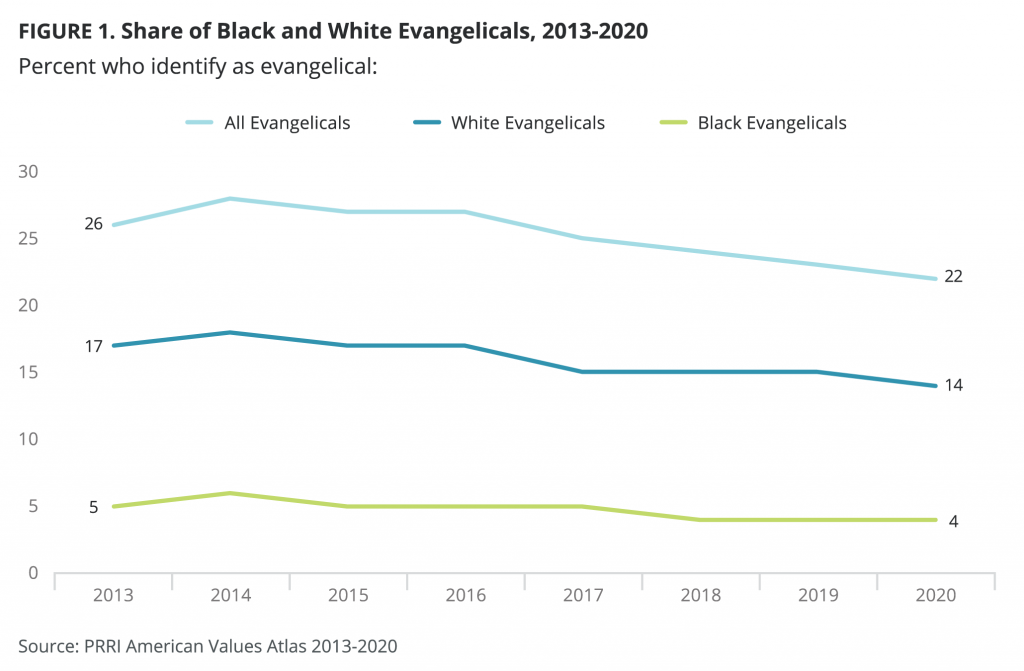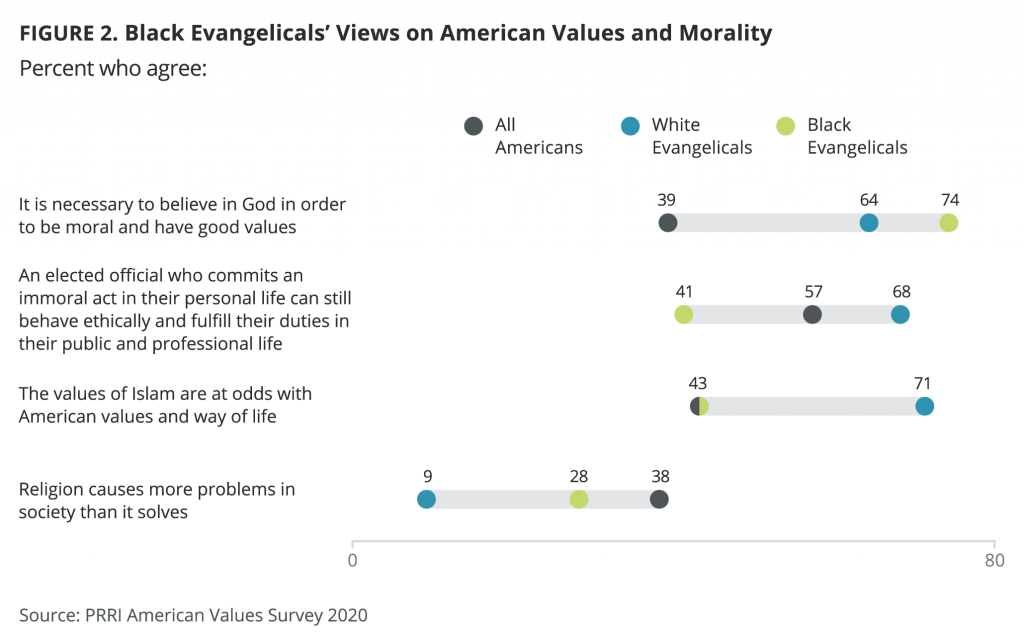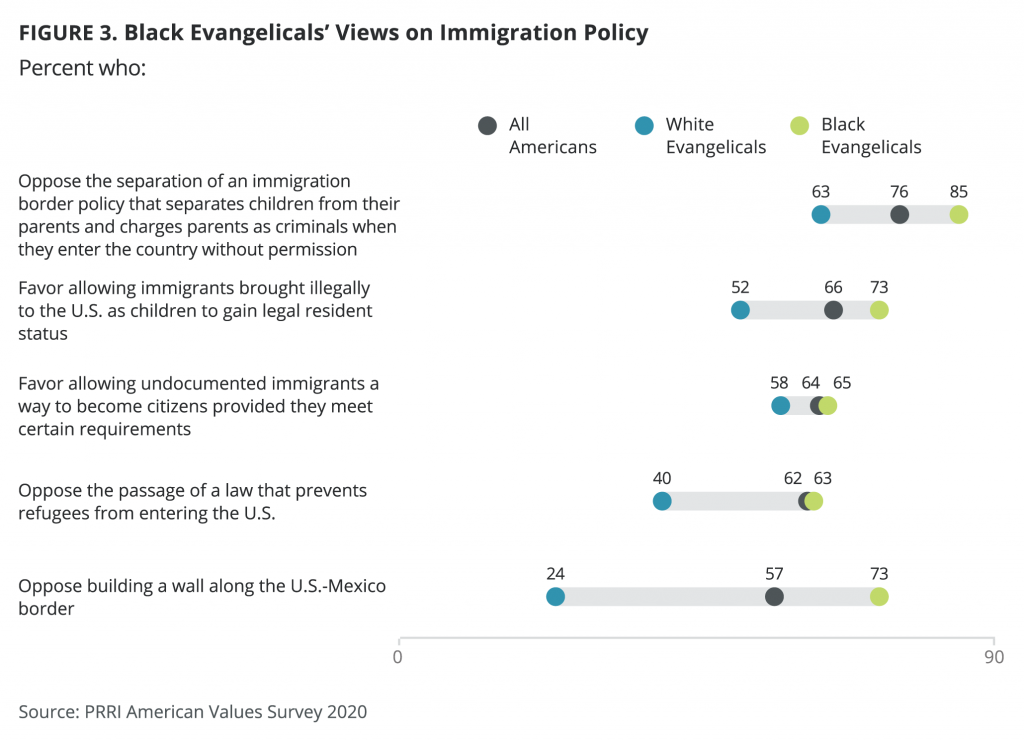Black evangelical Protestants and white evangelical Protestants share a core theological belief in considering themselves evangelical, or “born again,” but how those beliefs are expressed in voting behavior and policy preferences differs considerably. PRRI’s 2020 American Values Atlas shows that about one in five Americans (22%) identify as evangelical Protestant, down slightly from 26% in 2013. This change is mostly driven by the declining proportion of white evangelicals, from 17% to 14%, and a smaller decline among Black evangelicals, from five percent to four percent.

The same data in 2020 show that Black evangelicals (62%) are twice as likely as all Americans (33%) and three more times as likely as white evangelicals (20%) to identify as Democrats, while only eight percent of Black evangelicals identify as Republicans (compared to 51% of white evangelicals), which explains Trump and Biden’s favorability ratings during 2020. Only 22% of Black evangelicals reported a favorable opinion of former President Trump, while 80% favored President Joe Biden.
More evangelicals live in the South than in other regions. Specifically, the majority of Black evangelicals (53%) and nearly half of white evangelicals (46%) live in the South. More than two in ten Black evangelicals (22%) and 13% of white evangelicals live in the Northeast, while 26% of white evangelicals and 16% of Black evangelicals live in the Midwest. Only nine percent of Black evangelicals and 15% of white evangelicals live in the West.
Black Evangelicals’ Views on God and the Morality of Public Officials
Black evangelicals are three times as likely as white evangelicals to agree with the statement “Religion causes more problems in society than it solves” (28% vs. 9%), but do not differ significantly from white evangelicals in their agreement that “It is necessary to believe in God in order to be moral and have good values” (74% vs. 64%). However, in terms of intensity of agreement, Black evangelicals are nearly twice as likely as white evangelicals to completely agree (53% vs. 29%) with this statement. Moreover, Black evangelicals are notably less likely than white evangelicals to agree that “the values of Islam are at odds with American values and way of life” (43% vs. 71%).
Interestingly, Black evangelicals differ substantially from white evangelicals in their views of public officials’ behavior. While four in ten Black evangelicals (41%) say that elected officials who commit immoral acts in their personal lives can still behave ethically and fulfill their duties in public and professional life, nearly seven in ten white evangelicals (68%) agree.

Black Evangelicals’ Responses to the 2020 Summer Protests
Black Americans have long questioned social and racial inequities in America, which were especially visible during last summer’s protests over the killing of George Floyd and the desire to promote racial reconciliation. In response to the killings of Black Americans by police, data from the American Values Survey show that Black evangelicals are notably more likely than white evangelicals to say that these killings are part of a broader pattern of how police treat Black Americans (80% vs. 28%) rather than isolated incidents (20% vs. 70%), and that calls to “defund the police,” aim to redirect some police department funding to other social services (82% vs. 48%) rather than eliminate police departments (17% vs. 51%). Moreover, majorities of Black evangelicals support the goals of the “defund the police” movement (63%) and the goals of the Black Lives Matter movement (83%). Finally, most Black evangelicals (80%) say the U.S. government should provide some form of economic compensation to African Americans who are the descendants of enslaved people as a way to make up for the harm caused by slavery, segregation, and other forms of racial discrimination.
Not surprisingly, the vast majority of Black evangelicals, compared to a minority of white evangelicals, also say that the Confederate flag (86% vs. 17%) and the monuments to Confederate soldiers (75% vs. 10%) are more symbols of racism than of Southern pride, and also think that former president Donald Trump’s decisions and behavior as president encouraged white supremacists (81% vs. 26%).
Black Evangelicals’ Stances on Immigration Policies
Black evangelicals tend to show more favorable opinions toward immigration policies than white evangelicals and do not differ significantly on immigration views from the general public. For example, according to data from the 2020 American Values Survey, Black evangelicals are more likely than white evangelicals to oppose the separation of an immigration border policy that separates children from their parents and charges parents as criminals when they enter the country without permission (85% vs. 63%), to support allowing immigrants brought illegally to the U.S. as children to gain legal resident status (73% vs. 52%), to oppose building a wall along the U.S.-Mexico border (73% vs. 24%), and to oppose the passage of a law that prevents refugees from entering the U.S. (63% vs. 40%).
However, Black evangelicals do not differ from white evangelicals in their support for allowing undocumented immigrants a way to become citizens provided they meet certain requirements (65% vs. 58%), allowing them to become permanent legal residents but not citizens (16% vs. 14%), and identifying them and deporting them (16% vs. 27%).
